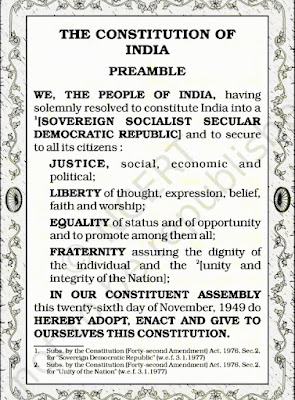The 'Preamble' of the Constitution of India is a brief introductory statement that sets out the guiding purpose and principles of the document, and it indicates the source from which the document which derives its authority, meaning, the people.
WE, THE PEOPLE OF INDIA having solemnly resolved to constitute India into a SOVEREIGN SOCIALIST SECULAR DEMOCRATIC REPUBLIC and to secure to all its citizens:
JUSTICE, social, economic and political;
LIBERTY of thought, expression, belief, faith and worship;
EQUALITY of status and of opportunity; and to promote among them all
FRATERNITY assuring the dignity of the individual and the unity and integrity of the Nation;
IN OUR CONSTITUENT ASSEMBLY this twenty-sixth day of November, 1949, do HEREBY ADOPT, ENACT AND GIVE TO OURSELVES THIS CONSTITUTION.
Sovereign: - It means people have the supreme right to take decisions on internal as well as external matters. No external power can dictate the government of India. In India, the legislature has the power to make laws which are subject to certain limitations.
Socialist: - It provides that the State has a responsibility towards citizen for their welfare, abolishing discrimination, nationalization of means of Production, equal distribution of wealth and securing Justice for all. It was added in the Preamble by 42nd Amendment, 1976.
Secular: - The term means that there is no separate religions of the state. It was added in the Preamble by 42nd Constitutional Amendment, 1976. Secularism is a part of the basic structure of the Indian Constitution and it means equal freedom and respect for all religions stated.
Democratic: - The people of India elect their governments by a system of universal adult franchise, popularly known as "one person one vote". In other way, it means that the form of government adopted by the Indian Constitution is based on the will of the people as expressed in elections.
Republic: - It is derived from the Latin phrase res publica, which means "the public thing" The term indicates that the head of the state is elected by the people.
The Indian concept of justice was spread by ancient Indian philosophers like Manu and Kautilya.
Article 38 and 39 of Indian Constitution defines distributive Justice. Distributive justice means fair distribution of resources among those who are in need of it.
Article 39A of the Indian constitution contains provisions relating to "Equal Justice and Free Legal Aid."
Indian Constitution defines 3 types of justice:-
Economic Justice
Political justice
1. Social Justice - The Supreme Court in the Kesavananda Bharati case held that social justice is part of Basic structure of the Indian constitution.
In the Case of S.R Bommai v. Union of India, the apex court held that social justice and judicial review are two basic features of the Indian constitution.
2. Economic Justice -Economic justice means there should be economic equality among everyone in the society. There should not exist any inequality among individuals based on their economic status.
In other way, it means providing economic opportunity, economic equality and removing economic disabilities. It is always implemented under the umbrella of Social Justice.
3. Political Justice - Political Justice means a system free from political arbitrariness. There should be political fairness in the working of the government. Every law should be equally applicable to every person irrespective of his political status.
Role of Judiciary- In today's time judiciary is the protector or civil rights, it acts as custodian of fundamental rights. It plays an important role in enforcement of all three types of justice given under Indian constitution.
In Maneka Gandhi v UOI, (1978), This is one of the most important judgements when it comes to cases related to Constitution. In this case a seven-judge bench discussed the question on violation of Articles 14, 19 and 21 all these articles have to be read together. Any law interfering with personal liberty of a person must satisfy the following three points: (i) it must prescribe a procedure; (ii) the prescribed procedure shall withstand the test of one or more rights guaranteed under Article 19 in a given situation and (iii) it must also be liable to be tested with reference to Article 14. As the law in question interfering with personal liberty of an individual must also be just and fair and it shall not be discriminatory or arbitrary.
LIBERTY: - According to the Preamble, all Indian citizens are guaranteed freedom of thought, expression, belief, faith, and worship through their fundamental rights, which are upheld in court in the case of a violation. Equality without Liberty would kill individual perception. Without equality and liberty life remains like an animal existence. In essence, the personal liberty promised in the Preamble, or the fundamental rights are not absolute but are qualified.
EQUALITY: - The word “Equality” means that every person, who lives within territory of India, has the equal right before the law. There is no discrimination based on religion, race, caste, sex and place of birth. It means that all will be treated as equality among equal and there will be no discrimination based on religion, race, caste, sex and place of birth.
FRATERNITY: - The term fraternity comes from the French phrase fraternité, which denotes brotherhood, friendship, community, and partnership. According to Ambedkar, the concepts of liberty, equality, and fraternity should not be considered individually.
According to the Preamble, fraternity ensures two things: human dignity and national integrity. The term "integrity" was inserted in 1976 by the 42nd Amendment Act.




.jpeg)

No comments:
Post a Comment